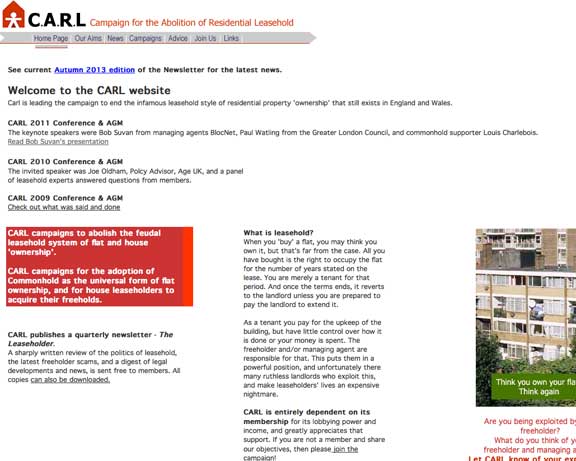The contentious Housing and Planning bill has now been enacted after much debate in Parliament. The bill was not originally intended to address any leasehold legislation but, during its passage, two key leasehold amendments were introduced in the Commons and the Lords. These amendments went on to be supported by both the government and the opposition and now come into force. These are amendments which should be welcomed by all leaseholders.
Section 130 – Tenants’ associations: power to request information about tenants
http://www.legislation.gov.uk/ukpga/2016/22/section/130/enacted
This gives the Minister the power to create detailed regulations entitling tenants groups (in this case ‘tenants’ = long leaseholders) to request contact information regarding fellow leaseholders so that they can then create and maintain a Recognised Tenants Association.
Regulations will now be produced to set out how and when the landlord must supply this information. The provisions only apply to England. Wales has the right bring forward its own wording on these matters.
LKP hopes to play an active role in suggesting those issues which officials will need to consider as part of the new regulations.
RTA’s are important, not because they provide many additional powers, but because they are the best means for leaseholders to effectively present their joint interests. As many of you will know RTA’s are often strongly resisted by many landlords. At the West India Quay hearing in 2014, where the landlord sought to oppose the formation of an RTA under any circumstances, surveyor Bruce Maunder Taylor, expert witness for the landlord, explained that RTA’s are sometimes comparable to trade unions from the 1970’s.
The fact that the landlord in the West India Quay case felt it relevant to spend over £75,000 resisting the creation of an RTA would go on to mean that it would became one of two key cases which finally led the government to review the rules and understand why the legislation needed to be changed.
LKP would like to acknowledge the work of both Sir Peter Bottomley MP and Lord Young in introducing the relevant wording, and offer thanks to barrister Amanda Gourlay who helped draft the initial wording.
This has been an issue which LKP has campaigned on for a number of years, in a project supported by groups such as the London Assembly, AgeUK, the British Property Federation, Centre Forum and the FPRA.
There have of course been many in the sector who have been less keen to see the law change. We still have far too many groups who want to blame the sectors problems on a lack of leaseholder understanding. Many of these same groups choose not to notice that a large number of landlords and managing agents do all in their power to ensure that forming an RTA is currently almost impossible.
We now know that preventing leaseholders from forming an RTA in one of the best ways to suppress the leaseholders joint understanding of the problems they face. It seems ironic that in the same week that the new legislation comes into force the landlord who spent £75,000 opposing an RTA faced a different sort of hearing for another site they own. Surprise surprise, landlords counsel made a point of noting that the applicants in the case regarding an appointment of a receiver manager had not succeeded in forming an RTA.
Section 131 – Limitation of administration charges: costs of proceedings
http://www.legislation.gov.uk/ukpga/2016/22/section/131/enacted
This is a major change in the costs regime at both the Tribunal and the County Courts. In situations where a landlord initiates an action against a leaseholder, the Courts and Tribunals are now allowed to use their discretion in limiting any costs which the landlord seeks to pass on to the leaseholder as administrative charges. Under the previous system there had been a growing number of cases where landlords had run up what the courts have described as “astronomical” costs, knowing that they could pass them on to the leaseholder.
S131 gives the Courts and Tribunals discretion to prevent the landlord from passing on some or all of those costs. Hopefully we will now see no more disputes starting in the County Court over debts of two or three thousand pounds, which turn into legal bills of ten or twenty thousand pounds. For those cases which are currently in progress both parties will need to consider how the new legislation applies. (as noted by anon in comments the commencement date for s131 has yet to be set and will not apply until that date is set)
Readers may remember that LKP reported the case of Dennis Jackson, where the landlord’s actions almost led to Mr Jackson’s £800,000 flat being forfeited, due to the landlord’s massive and spiraling legal costs.




 Martin Paine, embedded management companies, LKP … all raised in Queen’s speech debate
Martin Paine, embedded management companies, LKP … all raised in Queen’s speech debate






















Be a little bit careful about your wording – neither section is in force yet (and so is not actually law). S.130 comes into force on July 12 (see s.216(2)), but even then nothing actually happens until the regulations are made. Section 131 does not have a commencement date yet, so people can’t rely on it.
We explained s130 will need to have the regulations in place before the wording has effect but missed the fact s131 still has to have a commencement date.
Is there a reason why no commencement date has been set for s131? Do the courts expect there will be an influx of disgruntled leaseholders filing cases?
We believe the commencement date for s131 and the regulations for s130 may be moved forward together over the coming months.
When we are aware of the consultation details for s130 they will of course be posted on the site.
It seems possible that when s131 is in place that firms like JB Lietch and Brady’s will need to rethink the debt collection products they offer.
Well done Martin and Sebastian. If the EU was responsible for the kind of problems people endure as result of leasehold, and if the pace of reform was as tooth-pullingly slow, it would be front page news on the Daily Mail day after day after day.
As welcome as this reform is, the fact that it will have taken SO very long to get something like this done, given the tricks and gamesmanship that has been par for the course for years, says something about democracy in the UK.
Residential leasehold legislation seems to have been drafted to defend long-term interests of freeholders and law industry;
Anything short of abolishing this feudal, incredibly complex and unfair legislation is not an improvement.
In the current system freeholders, managing agents and their lawyers will only be too keen to litigate.
I doubt the legislation can be reformed; It should simply be abandonned and replaced with commonhold.
The Housing and Planning law only provides for a data base for rogue landlords/letting agents and does not provide for block management rogue managing agents who are unregulated and unlicensed. There is no way for lessees to report abuse unless they enter into litigation and face costs, or refer it to the Ombudsman Service Property which is only a slap on the wrist.
‘There is no way for lessees to report abuse’, so in actual fact enforcement is non existent. What leaseholder has the money, the time or the insanity, to instruct solicitors against ones own vindictive and all- powerful freeholder?
EU failed to help leaseholders so they cannot be excused for their part in tightening the hanging rope too
Whilst any progress in leasehold reform is welcome, it is clear that root and branch change will be arduous as unscrupulous freeholders and their advisers can be expected to place obstacles in the way of reform at each and every turn.
The argument put forward on behalf of the freeholder in the recent case concerning RTM companies is a case in point and was unconscionable.
In his statement during the Queen’s Speech debate, Sir Peter Bottomley rightly raised the question of criminality,
This question centres on the whole muddy and murky business that is the trade in the buying and selling of freehold title portfolios; a trade that takes place without even scant regard for the rights of unwiitting millions of leaseholders.
At best, new build leasehold purchasers are being lured into unreasonable contractual arrangements in an unregulated field. At worst, existing long leaseholders (usually requiring lease extensions) are discovering that freehold title to their premises has been sold and purchased without their knowledge and in criminal breech of their right of first refusaL (s4 LTA85 as amended Housing Act 96).
It is in this trade that English law is being treated with contempt by a hardcore of unscrupulous freeholders and their advisers.
No one is above the law, and in my view this is the area that LKP and its patrons should be focusing attention.on. in order to ensure that existing legislation is upheld.
So many residential freeholds are now owned by overseas unknown entities, (or another loophole I discovered, the owner is a private overseas individual but the title is registered to a solicitor in England. ) There is no accountability, and is virtually impossible to work out who owns what, if the correct tax is paid, etc. In the meantime, the leaseholders who live here have to pay to support those ‘investments’. The government needs to look into these issues properly and make it unsustainable for them to continue exploiting us.